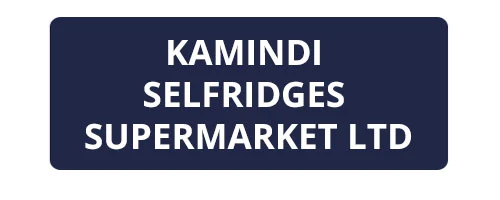Kamindi Selfridges Supermarket Limited’s Tax Appeals Triumph
On October 30, 2020, the Tax Appeals Tribunal in Nairobi delivered a resounding judgment in Kamindi Selfridges Supermarket Limited vs. Commissioner for Investigations and Enforcement (TAT Appeal No. 52 of 2017), a case brilliantly argued by MGW Advocates LLP. The Tribunal set aside a Kenya Revenue Authority (KRA) objection decision demanding Kshs. 153,485,437 in taxes, penalties, and interest, ruling that KRA’s additional assessment for the years 2005–2009 was unlawful, untimely, and procedurally flawed. This landmark victory for Kamindi Selfridges Supermarket Limited is more than a win for a single business—it is a powerful affirmation of taxpayer rights, constitutional protections, and the rule of law. It exposes deep-seated issues in KRA’s tax administration and serves as a clarion call for reforms to ensure fairness, transparency, and accountability in Kenya’s tax system.
Kamindi Selfridges Supermarket Limited, a Kenyan company retailing consumer goods from foodstuffs to clothing, found itself ensnared in a protracted tax dispute that began with a KRA raid on its premises on February 9, 2011. During this raid, KRA carted away accounting documents for 2005–2010 without proper inventory, setting the stage for a decade-long ordeal. In 2012, KRA issued a tax demand for Kshs. 77,871,335, followed by a revised assessment in May 2013 for Kshs. 70,540,151, covering corporation tax, VAT, PAYE, withholding tax, and rental income. Kamindi cooperated, paying the principal tax of Kshs. 18,573,832 by September 2013 and requesting a waiver of penalties and interest. Yet, KRA’s responses were evasive, demanding further payments as a condition for considering the waiver, which it never addressed despite multiple follow-ups.
The situation escalated in November 2016 when KRA issued an additional assessment of Kshs. 72,607,955 for 2005–2009, alleging overstated purchases. Kamindi objected, citing the assessment’s untimeliness and KRA’s failure to return seized documents. Shockingly, KRA’s objection decision in February 2017 not only upheld the assessment but inflated the demand to Kshs. 153,485,437, a move MGW Advocates LLP argued was illegal under the Tax Procedures Act, 2015. Representing Kamindi, the firm filed an appeal, contending that KRA’s actions violated statutory timelines, constitutional rights, and principles of fair administrative action.
MGW Advocates LLP’s legal strategy was a masterclass in precision and principle. They argued that KRA’s additional assessment, issued seven to twelve years after the tax periods, contravened Section 31(4)(b)(i) of the Tax Procedures Act, which limits amendments to five years unless fraud, gross neglect, or evasion is proven—none of which KRA substantiated. The firm highlighted KRA’s failure to provide evidence or return seized documents, denying Kamindi its right to a fair defense under Article 50(2)(b) of the Constitution. Most critically, they challenged KRA’s objection decision for exceeding its mandate under Section 51(8), which restricts the Commissioner to allowing or disallowing an objection, not increasing the assessment. The Tribunal agreed, finding KRA’s actions unlawful, untimely, and contrary to the doctrine of legitimate expectation, as KRA had concluded its 2005–2010 investigation in 2013, only to reopen it without notice four years later.
The Tribunal’s ruling on October 30, 2020, was a triumph for justice. It set aside KRA’s objection decision, affirming that the additional assessment lacked legal and factual basis. By invoking Articles 47 and 50 of the Constitution, the Fair Administrative Action Act, 2015, and precedents like Republic vs. Kenya Revenue Authority Ex Parte M-Kopa Kenya Limited (2018), MGW Advocates LLP exposed KRA’s procedural overreach. The decision underscores the mandatory nature of statutory timelines, the right to expeditious administrative action, and the need for transparency in tax assessments. Kamindi’s victory is a beacon for businesses burdened by arbitrary demands, reinforcing that KRA cannot wield its powers unchecked.
This ruling carries profound implications for Kenya’s tax landscape. It compels KRA to adhere to the five-year statutory limit for assessments, protecting taxpayers from demands for long-past periods. It also demands procedural fairness, ensuring taxpayers receive clear evidence and opportunities to respond, as mandated by Article 47. Economically, it safeguards businesses, particularly SMEs like Kamindi, from financial strain caused by prolonged disputes and accruing interest, aligning with Kenya’s Bottom-Up Economic Transformation Agenda 2022-2027. The case parallels other taxpayer victories, like Sintel Security Print Solutions (2025), where MGW Advocates LLP successfully challenged KRA’s customs valuation, and Ashok Shah & Mital Shah (2024), where untimely objection decisions were struck down, cementing a judicial trend toward accountability.
MGW Advocates LLP’s triumph in Kamindi is a testament to the power of legal advocacy in holding public institutions accountable. Their meticulous arguments, grounded in statutory provisions, constitutional rights, and judicial precedents, dismantled KRA’s case, saving Kamindi from an unjust financial burden. This victory demands urgent reforms: KRA must adhere to statutory timelines, provide clear evidence for assessments, and engage taxpayers fairly. Parliament should enact the Whistleblower Protection Bill and AI legislation to prevent systemic abuses. As Kenya strives for economic justice, the Kamindi ruling, secured by MGW Advocates LLP, stands as a rallying cry for a tax system rooted in fairness, transparency, and the rule of law.
